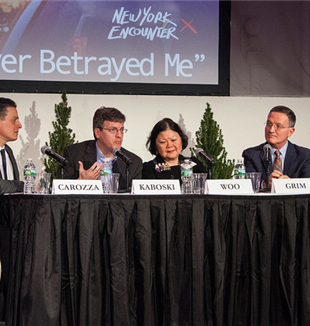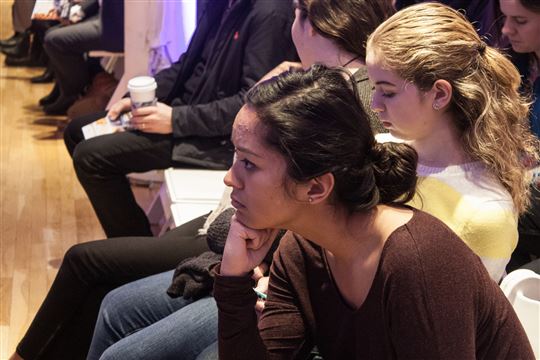
Economy With a Truly Human Purpose: Is It Possible?
"All three speakers ... stressed the importance of recognizing and acting on our own freedom as social, political and economic participants." Paolo Carozza, Carolyn Woo, Joseph Kaboski and Brian Grim tackled human economics at the 2017 New York Encounter.Before addressing the quote that titled this panel, Carolyn Woo returned to the theme of the New York Encounter. Woo, who just completed her tenure of five years as President and CEO of Catholic Relief Services following an extensive academic career, began, “Reality has never betrayed me; I agree with that statement, but I don’t totally understand it. In the work that I did with CRS, we worked with one hundred million people a year in the midst of the most depraved and deprived conditions. Oftentimes I stand at the foot of the cross. That reality is heartbreaking.” In front of such suffering, how do we adequately respond to the needs of the human person in the area of human economic development?
Joseph Kaboski, Professor of Economics at the University of Notre Dame, outlined five major needs that we face today when we consider what an “economy with a truly human purpose” might include: global poverty, environmental crisis, increasing wealth inequality in our society, a lack of family stability and a decrease of local community involvement in the Western world, and rapid technological change. Kaboski explained that addressing these needs requires a combination of efforts from the areas of private enterprise and business, government and public policy, and cultural change. He emphasized that at the center of any such endeavor is the issue of how we use our freedom, and that, in order to understand how to use our freedom well, we need a conception of ourselves as human beings as more than simply autonomous, rights bearing beings.
Kaboski emphasized that markets and governments do not exist on their own but through human beings acting and making choices. The issue is not, therefore, whether markets and governments are in themselves good or bad, but how, through a deeper understanding of ourselves and our human needs, we can learn to use them well. In order to demonstrate the positive value that enterprise can have when used well, Woo told the story of Ernesto, a man in Nicaragua who was at risk of losing his ancestral maize farm due his crop’s lack of export value. Ernesto would hide whenever he heard the motorcycles of debt collectors, terrified that they would take his farm and he would become a homeless day laborer.
Eventually, Ernesto entered into a CRS program that teaches farmers how to grow different crops that have an export value, and soon he mastered the art of growing papayas. Discovering that if he germinated his seeds in a greenhouse they would have a much higher success rate, he started a business germinating the seeds for his farm as well as the farms of his neighbors. He learned how to use chemical fertilizers effectively, and, at the same time, some women of his village started another business making manure for local farms such as his. “Now,” Woo said, “Ernesto has two motorcycles of his own.” Woo gave this example in order to demonstrate that programs which attend to the true needs of the person have the capacity to empower individuals while also generating a positive ripple effect within the broader community.
Brian Grim, President of the Religious Freedom and Business Foundation and a leading expert on religious demography, described the positive economic impact that religious freedom plays in integral human development. While some people think of religious freedom in terms of separation of church and state or lack of government interference in religion, Grim prefers to think of it in a fuller sense, as a freedom that enables people to bring their full selves into everything they do and to approach reality in a holistic, human way. His foundation focuses on fostering interfaith understanding and on developing programs through which business and enterprise become forces for peace, in partnership with the Business for Peace platform of the United Nations Global Compact. He gave several examples of situations in which enterprise has become a tool to peacefully and effectively empower people and communities, telling the story of former Hershey Chocolate Vice President Don Larson who, after a religious conversion, decided to help rebuild the cashew industry in Mozambique. This industry, the major source of income for the country, had been decimated by a lengthy civil war. Larson chose to “reverse tithe,” Grim explained, making sure that at least 90% of the company’s profits went back to Mozambique and hiring local families and war widows who still had cashew trees growing in their back yards to be his suppliers. Now, the company he started, Sunshine Nuts, sells their cashews in supermarkets throughout the United States.
All three speakers continuously stressed the importance of recognizing and acting on our own freedom as social, political, and economic participants. Woo explained that we underestimate both our power and our responsibility as consumers and citizens — if you are concerned about carbon emissions, she pointed out, you should carefully review the investments in your retirement portfolio to make sure that you are investing in companies whose practices you truly support. You can also get involved in advocacy on behalf of public policy and business practices that meet the criteria that Pope Francis and other proponents of a truly human economy have set forth. Kaboski pointed out that how we become the “salt and light” of the world goes all the way back to our own homes and how we raise our children. And Grim discussed the importance of allowing God to guide us in the important decisions of our lives so that our participation in the three central areas of business, public policy, and culture is, first of all, a way of following Him.
Paolo Carozza, Director of the Kellogg Institute at the University of Notre Dame and moderator of the panel, concluded the discussion by returning to a passage in which Fr. Luigi Giussani reminds us that “the forces that change the human heart and the forces that change history in the end are the same.”#NewYorkEncounter